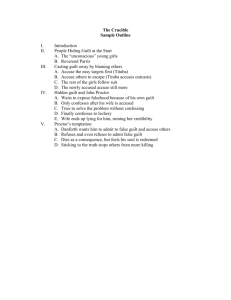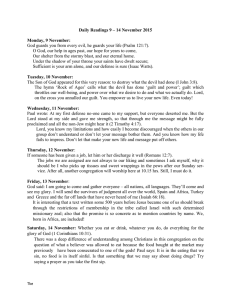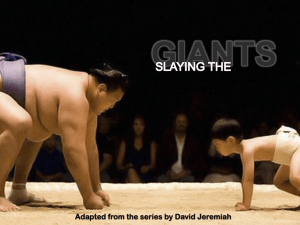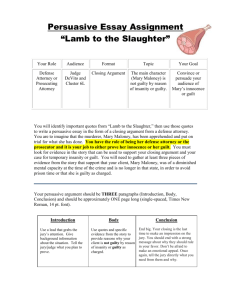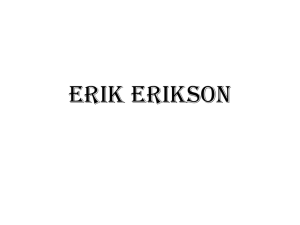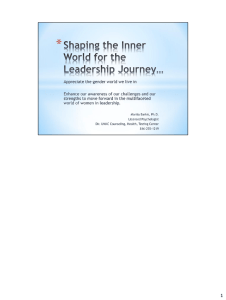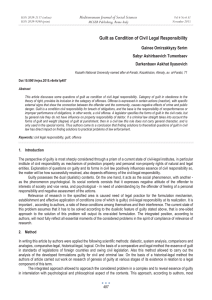USA Today 09-17-07 The 'Guilty Green' (gasp!) don't always recycle
advertisement
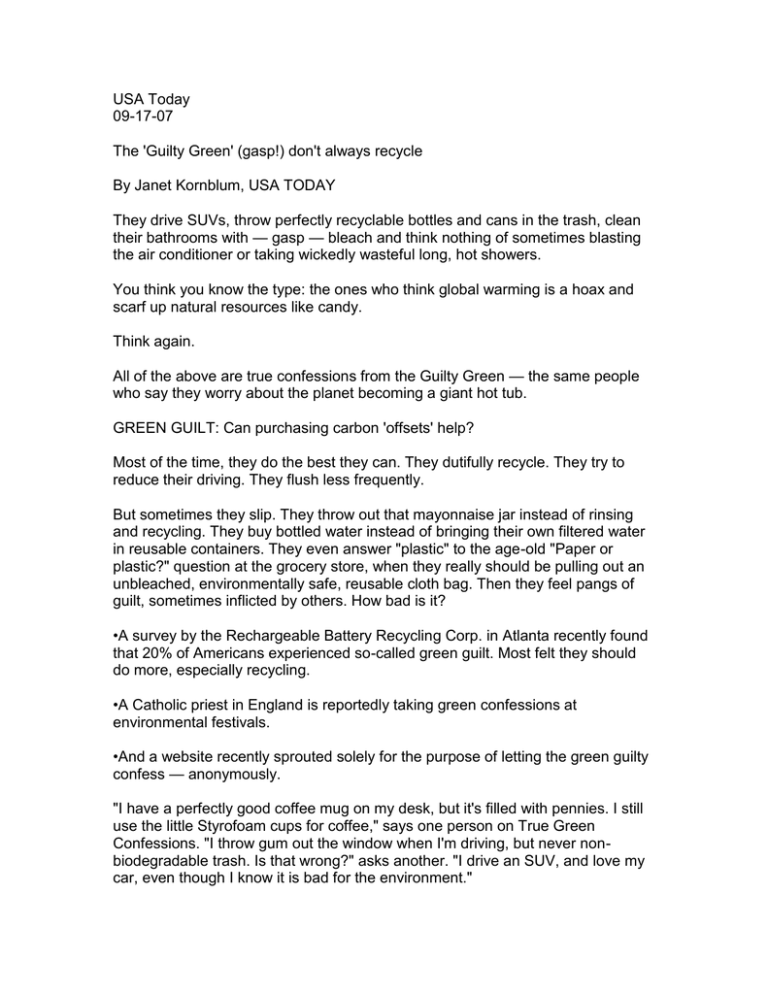
USA Today 09-17-07 The 'Guilty Green' (gasp!) don't always recycle By Janet Kornblum, USA TODAY They drive SUVs, throw perfectly recyclable bottles and cans in the trash, clean their bathrooms with — gasp — bleach and think nothing of sometimes blasting the air conditioner or taking wickedly wasteful long, hot showers. You think you know the type: the ones who think global warming is a hoax and scarf up natural resources like candy. Think again. All of the above are true confessions from the Guilty Green — the same people who say they worry about the planet becoming a giant hot tub. GREEN GUILT: Can purchasing carbon 'offsets' help? Most of the time, they do the best they can. They dutifully recycle. They try to reduce their driving. They flush less frequently. But sometimes they slip. They throw out that mayonnaise jar instead of rinsing and recycling. They buy bottled water instead of bringing their own filtered water in reusable containers. They even answer "plastic" to the age-old "Paper or plastic?" question at the grocery store, when they really should be pulling out an unbleached, environmentally safe, reusable cloth bag. Then they feel pangs of guilt, sometimes inflicted by others. How bad is it? •A survey by the Rechargeable Battery Recycling Corp. in Atlanta recently found that 20% of Americans experienced so-called green guilt. Most felt they should do more, especially recycling. •A Catholic priest in England is reportedly taking green confessions at environmental festivals. •And a website recently sprouted solely for the purpose of letting the green guilty confess — anonymously. "I have a perfectly good coffee mug on my desk, but it's filled with pennies. I still use the little Styrofoam cups for coffee," says one person on True Green Confessions. "I throw gum out the window when I'm driving, but never nonbiodegradable trash. Is that wrong?" asks another. "I drive an SUV, and love my car, even though I know it is bad for the environment." Guilt even hits hard-core environmentalists. Paige Rodgers of Corte Madera, Calif., is so environmentally minded that she helped design a new product, Fabkins, reusable napkins for kids. She recycles, carries bags in her car for groceries and often finds herself thirsty because she forgot to bring her own filtered water and doesn't want to buy wasteful bottled water. But still, "I drive an SUV," she says. "True confession. I do feel guilty about that. But I justify it because we don't drive that much." Writer and humorist Lou Bendrick, who recently wrote about green guilt for online environmental magazine Grist, says she understands why people feel so guilty. "The more you know about global warming, the more you see how human actions can impact the Earth," she says. "Pretty soon you start thinking that if you don't buy organic toothpaste, the Greenland ice sheet is going to melt." She admits she takes "showers that are so long that I'm guessing whole rivers are diverted while my conditioner sets," she says. That sort of "omnipotent" guilt — when people have "an exaggerated sense of their own power" — is quite common, says psychologist Lynn O'Connor, a professor who specializes in guilt at the Wright Institute in Berkeley, Calif. "You really are not responsible for the whole planet nearing extinction." But sometimes it seems like it. Bill McKibben, author of The End of Nature and other environmental books, confesses to what he thinks is an eco-sin: "I have eight pairs of skis, where really, one would do." These days, McKibben, of Ripton, Vt., has a new sin: He spends a lot of time crisscrossing the country by plane. "I have basically been in the air non-stop," he admits. Somewhat ironically, he has been meeting with students to help them organize to fight for the environment. But he still feels guilty because planes cause a lot of pollution. "There is plenty of guilt to go around," McKibben says. "We're all guilty at some level. A hundred years from now we'll look back on all our habits with a certain amount of disgust and unbelief: 'You were driving what?' " he says, referring to SUVs and other vehicles that get low gas mileage. But he adds that while we should all do more to conserve energy, he agrees that individuals have far less power than we might think. "In the long run, beating yourself up about (green sins) is a lot less important than beating yourself up about why you're not figuring out what you can do politically to get something done," he says. Danny Seo, an "environmental lifestyle expert" and author of the Simply Green book series, sees a lot of eco-inspired guilt. "The No. 1 thing I get from everyone is 'I'm sorry, I have an SUV, but I have children,' " Seo says. "I say 'It's fine. It's OK.' … When you have guilt, it's sort of admitting 'I know I've been doing something bad long enough.' " But he notes that "guilting" someone can easily backfire. He's right, O'Connor says. Guilt is great for interpersonal relationships: It prompts people to apologize when they've done something wrong. But it doesn't really work for mass movements. "Guilt is not a good way to get people to do something. There's a risk of turning people off," she says. "Rather than making people feel guilty, presenting a model of something that's very small and doable without laying any judgment is going to be much more effective." Others agree. "Let's face it: Environmentalists have a bit of a reputation for being sanctimonious," Bendrick says. Lily Fessenden of the Audubon Expedition Institute at Lesley University in Cambridge, Mass., says she used to be like that. "I actually have evolved … shaming people doesn't work at all." But she understands just where the guilt comes from. Even though she saves just about everything (she composts food waste and makes sure she reuses old bags, food containers and trashed shirts for other purposes), she still feels bad about some indulgences, such as the big-screen TV her husband bought. "The reason for feeling guilty is knowing we are drawing down on the natural capital that we have. We're on the train heading for a cliff and everyone's partying. Nobody's looking out the window. It's just logical that if you use resources faster than they can be replenished, there will be a wake-up call." Most people really do want to do better, says Randy Paynter, CEO of Care2, a social networking site dedicated to social change and action. But they don't know where to turn or "feel it's too difficult." His site offers tips for going green, such as trying lemon juice to whiten the wash rather than chlorine bleach. It also allows people to donate to various causes online. "What we find is when (people) get involved, even at a simple basic level, they realize that they've done something good and it feels good," he says. "They often feel empowered and want to do more." Other sites and companies offer so-called carbon offsets to offset the pollution you create. But the jury is out on whether such programs really work. Being truly green is hard, says Amy Kaleita, assistant professor of agriculture and biosystems engineering at Iowa State University. "A lot of the things people are doing are a result of hearing a sound bite on TV or seeing a bullet point in a magazine or noticing a banner ad featuring their favorite celebrity. The truth is, it takes more proactive analysis of your own lifestyle to come up with solutions that are really going to lighten your environmental impact." In the meantime, what should people do with their guilt? "What I try to tell people is don't sweat the small stuff," says Chip Giller, founder of Grist. "An individual can have more impact if they focus on bigger purchasing decisions." Buying a hybrid car or a water- and energy-saving washer and dryer has more impact than worrying about paper or plastic, he says. In the long run, he's hoping to effect change at the government and corporate levels. And for individuals, his hope is that being environmentally friendly will become routine. "Right now, green is trendy. But we want it to become second nature — like it is to put on a seat belt." Are you a member of the "Guilty Green?" Share your experiences below and ways you have helped and hurt the environment.


